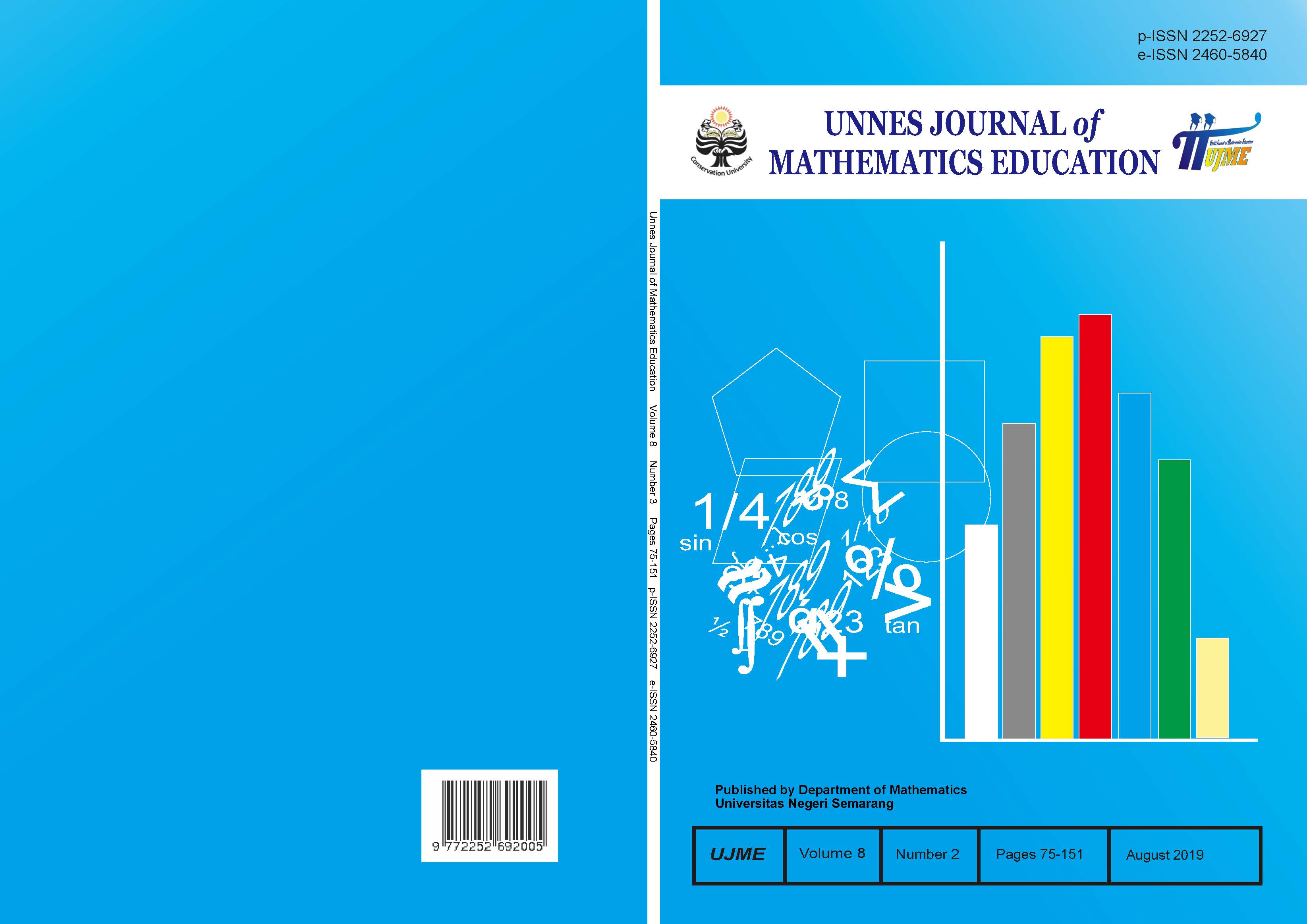Mathematical creative thinking ability of 7th grade student observed from self-confidence in learning RTTW with open ended approach
##plugins.themes.academic_pro.article.main##
Abstract
The purpose of this research is to test students' creative thinking abilities in RTTW learning with open ended approach to achieve individual and classical learning completeness, to test the mathematical creative thinking abilities of students taught in RTTW learning with open ended approach better than Discovery Learning, to describe thinking skills students' mathematical creativity observed from self-confidence in RTTW learning with open ended approach. The method used is mixed method. Quantitative methods are used to determine students' mathematical creative thinking abilities using tests, while the qualitative method used documentation and interviews. The study population was students of Junior High School Grade 7th, with class VII F as the experimental class and VII E as the control class. The research subjects were 6 subjects chosen based on the self-confidence category of class VII F. The results showed that (1) the results of RTTW learning with open ended approach to completing individual learning completeness, (2) the results of the RTTW learning had an open ended approach to achieving classical learning completeness, (3 ) the mathematical creative thinking abilities of students in RTTW learning with open ended approach better than Discovery Learning, (4) subjects of the upper self-confidence group are able to meet 4 indicators, the middle group is able to meet 2 indicators, the lower group is able to meet 1 indicator.
##plugins.themes.academic_pro.article.details##
References
Faridah, N., Isrok’atun, Aeni, A.N. (2016). Pendekatan Open Ended untuk meningkatkan kemampuan berpikir kreatif matematis dan kepercayaan diri siswa. Jurnal Pena Ilmiah.1(1):1061-1070.
Firdausi, Asikin, M. dan Wuryanto. (2018). Analisis Kemampuan Berpikir Kreatif Siswa Ditinjau dari Gaya Belajar pada Pembelajaran Model Elicting Activities (MEA). Prisma.240.
Hendriana, H. (2014). Membangun Kepercayaan Diri Siswa Melalui Pembelajaran Matematika Humanis. Jurnal Pengajaran MIPA. 19(1):52-60.
Hendriana, H., Rohaeti, E.E. & Sumarmo, U.. (2017). Hard Skills dan Soft Skills Matematik Siswa. Bandung: Refika Aditama.
Irawan, A. & Surya, E,. (2017). Application of the Open ended Approach to Mathematics Learning in the Sub – subject of Rectangular. International Journal of Science: Basic and Applied Research.33(3) :270-279.
Jahani, F. & Behzadi, M.H. (2014). Effect of Self-Believe of Students on Educational Progress of Mathematics. ISPACS :1-8.
Jagom, Y.O. (2015). Kreativitas Siswa SMP dalam Menyelesaikan Masalah Geometri Berdasarkan Gaya Belajar Visual – Spatial dan Auditory-Sequential. Math Didactic: Jurnal Pendidikan Matematika.1(3):176-190.
Kemendikbud. (2014). Permendikbud nomor 58 tahun 2014 tentang Kurikulum 2013 SMP/MTS.
Kuneni, Isnarto dan Sugiarto. (2015). Keefektifan Pembelajaran Creative Problem Solving (CPS) dengan Teknik Probing Prompting Berbantuan CD Pembelaajran Terhadap Kemampuan Berpikir Kreatif Siswa Kelas VII. Unnes Journal of Mathematics Education. 4(3):276-283.
Kunhertanti K dan Santosa, R.H. (2018). The Influence of Students’ Self-confidence on Mathematics Learning Achievement. Journal of Physics.2 : 1-6.
Lambertus., Arapu, L. dan Patih,T. (2013). Penerapan Pendekatan Open ended untuk Meningkatkan Kemampuan Berpikir Kreatif Matematik Siswa SMP. Jurnal Pendidikan Matematika. 2013.4(1):73-82.
Munroe, L. (2015). The Open- Ended Approach Framework. European Journal of Educational Research.4(3) :97-104.
National Council Teacher of Mathematics. (2000). Principles and Standards for School Mathematics. Reston, Virginia: National Council of Teachers of Mathematics.
National Teaching Institute (NTI Journal) season 4 of the may, 2014 The 3-8 ELA modules. Grades 3-8 ELA Turkey Kit for Teachers.
OECD. (2016). PISA 2015 Result in Focus.
Pratinuari K, Sugiarto & Pujiastuti, E. (2013). Keefektifan Pendekatan Open ended dengan Pembelajaran Kontekstual Terhadap Kemampuan Berpikir Kreatif. Unnes Journal of Mathematic Education.2(1):105-113.
Pratiwi, L.A., Dwijanto & Wijayanti, K. (2019). Analisis Kemampuan Berpikir Kreatif Matematis pada Pembelajaran Read, Think, Talk, Write Ditinjau dari Kecemasan Matematika. Prisma. (2):576-582.
Ramadhani, I, Marian,S. & Waluya, St. B. (2015). Keefektifan Model PBL dengan Mind Map Melalui Hands On Activity Terhadap kemampuan Berpikir Kreatif Siswa. Unnes Journal of Mathematics Education.4(2):188-195.
Relita, D.T. & Regina, F. (2015). Hubungan antara Rasa Percaya Diri dengan Hasil Belajar pada Mata Pelajaran Ekonomi Siswa Kelas XI Sekolah Menengah Atas Karyasekadau Tahun Pelajaran 2014/2015. Jurnal Profit. 2(2):122-130.
Solehuzain & Dwidayati, N.K. (2017). Kemampuan Berpikir Kreatif dan Rasa Ingin Tahu pada Model Problem Based Learning dengan Masalah Open ended. Unnes Journal of Mathematics Education Research.6(1):103-111.
Sugiyono. (2016). Metode Penelitian Manajemen. Yogyakarta: Alfabeta.
Suyitno, A. (2018). Penelusuran Letak dan Penyebab Kesalahan Dalam Mengerjakan Soal Sebagai Basis untuk Pengungkapan Pertumbuhan Kreativitas Matematis Mahasiswa. Program studi pendidikan matematika pasca sarjana Unnes. Disertasi.
Tresnawati, Wahyu,H. & Rohaeti, E.E. (2017). Kemampuan Berpikir Kritis Matematis dan Kepercayaan Diri Siswa SMA. Symmetry. 2(2):116-122.
Turgut, S. &Turgut, I.G. (2018). The Effects of Cooperative Learning on Mathematics Achievement in Turkey: A Meta – Analysis Study. International Journal of Instruction, 11(3):663-680.
Vandini, I. (2015). Peran Kepercayaan Diri Terhadap Prestasi Belajar Matematika Siswa. Jurnal Formatif. 5(3):210-219.
Undang–Undang Republik Indonesia Nomor 20 Tahun 2003 Tentang Sistem Pendidikan Nasional. (Act of The Republic of Indonesia Number 20, 2003)
